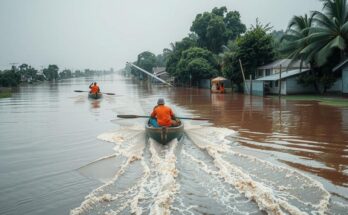The ICJ is hearing a case that may clarify governmental responsibilities regarding climate change, with nearly 100 countries participating, initiated by Vanuatu. The hearings, set to last until December 13, 2023, aim to address what nations should do in response to climate change and reparations for damages caused by global warming. Although non-binding, the outcomes could strengthen climate litigation worldwide and aid small island states in seeking reparations from developed countries.
The International Court of Justice (ICJ) has commenced hearings on a pivotal case concerning the legal responsibilities of states regarding climate change. Nearly 100 nations, including Vanuatu, which initially sought a legal opinion, are set to provide evidence. The hearings aim to elucidate what nations must undertake to combat climate change and the actions to redress damages attributed to global warming. Despite the ruling being non-binding, it may reinforce climate litigation globally.
Originally proposed by law students in Fiji five years ago, the initiative gained traction with Vanuatu, an island nation grappling with the adverse effects of climate change. In the previous year, two cyclones affected approximately 80% of Vanuatu’s population, prompting a prolonged state of emergency. Under significant influence from Vanuatu and similar nations, the UN General Assembly tasked the ICJ with addressing key climate queries related to international legal obligations to mitigate greenhouse gas emissions.
During the hearings, Vanuatu will commence evidence presentation, with Ralph Regenvanu, the nation’s special envoy, underscoring its frontline position in the climate change crisis. The request for an advisory opinion from the ICJ is seen as a critical moment that may clarify international climate obligations. Although the court’s decision does not impose binding rulings, it could serve as a reference for smaller island states pursuing reparations from developed nations for damages incurred due to historical greenhouse gas emissions.
The court proceedings follow the recent COP29 climate summit in Azerbaijan, where developed countries pledged to allocate $300 billion annually for climate finance by 2035, a commitment viewed as inadequate by developing nations. The hearings, which will include testimony from the United States, China, and members of OPEC, are scheduled to continue until December 13, 2023, with a legal opinion anticipated in 2025.
As climate change increasingly threatens nations worldwide, the necessity for clear legal frameworks and responsibilities has become essential. The ICJ’s involvement signifies a critical moment where international law intersects with environmental policy, particularly concerning how nations must act to mitigate climate impacts and rectify past harms. With Vanuatu leading the charge, the hearings represent a collective movement from vulnerable states advocating for justice and accountability in climate negotiations.
The ICJ’s hearings on climate responsibilities mark a significant step towards defining the legal obligations of nations in combating climate change and addressing its repercussions. While the outcomes will not be legally binding, they may influence future climate-related lawsuits and ensure that smaller island nations have a voice in global environmental matters. The call for legal clarity comes at a crucial time, reflecting the urgent need for action and support from developed nations towards climate-affected countries.
Original Source: www.bbc.com




